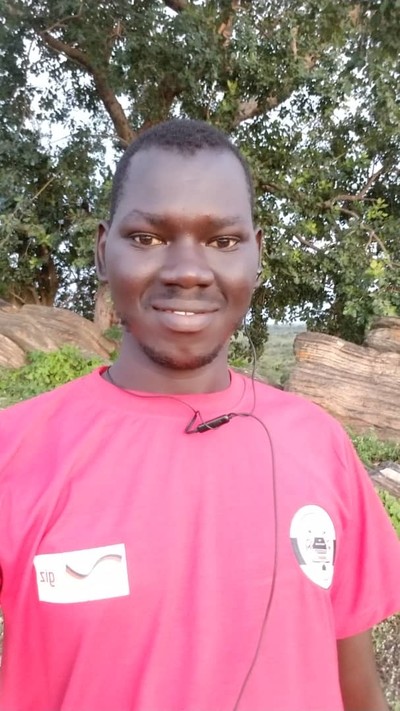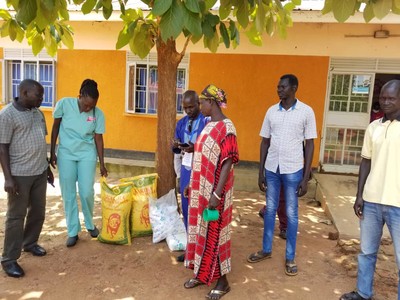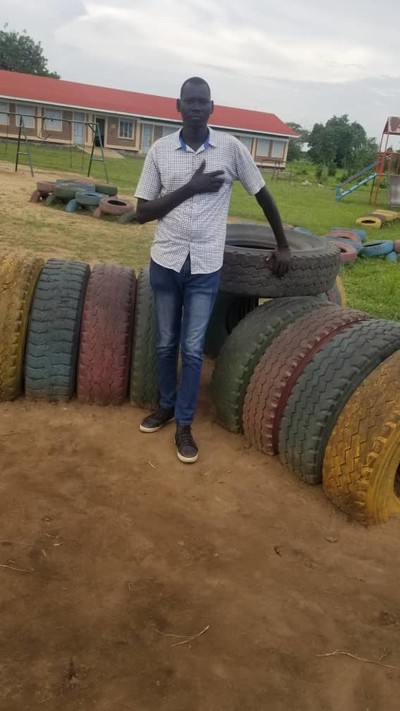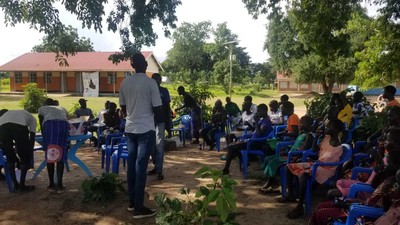
Blog: Interview with Phillip Amol Kuol, Cairdeas Scholar
![]() Hannah Ikong
Hannah Ikong
![]() 27th October 2022
27th October 2022
Phillip Amol Kuol is all about giving back; as a South Sudanese refugee living in Northern Uganda, he opted to assist as a translator then volunteer in a village health team (VHT), where he received palliative care training through the Transform Project. Phillip is now a Cairdeas Scholar and pursuing a bachelor’s degree in social work as he continues to serve his community. Below is the summary and quotes from a phone interview with Phillip, as told to Hannah Ikong on 19th October 2022.
There is so much to tell, it is hard to know where to begin! I think Phillip could write a book one day on his experiences and lessons learnt. We agreed though to start the conversation with the item that connects Phillip to Cairdeas, and that is palliative care.
Phillip’s first encounter with palliative care healthcare providers was in Adjumani camp, where he was working as a translator for South Sudanese refugees at a community health centre. Vicky Opia, from Peace Hospice Adjumani, visited the health centre to see a child who had previously even gone to Kampala due to their chronic illness, and she needed Phillip’s assistance in communicating to the family. Phillip’s interactions with Vicky Opia continued and she referred him to other staff of the Mulago Palliative Care Unit and Cairdeas IPCT. Soon after, Phillip was invited by the team of the Transform Project for the Volunteer Health Team (VHT) palliative care training in 2019.
Phillip remembers fondly the times of training for palliative care as a VHT and the ongoing discussions between himself and the trainers. “I am so proud of the [palliative care] training, and that is why I am so thankful to them. So that training has really opened up my mind and it has helped me to change the lives of the adolescents, to change the life of the elderly, and I still hoping to change more in the lives of the refugees. That is, in the life of my countrymen.”
With one person in particular, Dr Mhoira Leng, he shared about his course in child protection at Nsamizi Training Institute at Adjumani, as well as his dream to become a social worker. “She told me that, we are going to look for a chance for you to go and study,” recounts Phillip, “What do you want to do, actually, that’s the question that she offered to me. I told her that I wanted to be a social worker, I am interested in doing social work to back my child protection paper up (because child protection was for two years). And she said it was okay.”
Through a Cairdeas scholarship, Phillip started attending Uganda Christian University (UCU) in September 2021. He initially was able to attend the Adjumani Teaching Centre branch of UCU but as it has since closed (due to reasons unknown to Phillip), his studies have come through the UCU Arua Campus in Northwest Uganda. He is already in his third semester of school, where his current classes are preparing him for not only social work, but social administration and community health.
“I am doing social work and social practice theories,” Phillip explained to me over our phone call, “and at the same time I am doing what they call worldview … where I am supposed to search out for the social problem and I am supposed to write some report about it.” In addition to course work, Phillip has been active in the UCU internships and has some upcoming fieldwork to complete. He plans to graduate with his diploma in social work and social administration in September 2023, then he will continue with a two year course to obtain a bachelor's degree in social work and social administration.
Phillip shared a few stories with me, which reflected his heart towards reaching the whole community, both young and old, male and female, regardless of their condition or chronic illness. As he explained to me later – “I do see everyone as a family member.” Early in his service at the Adjumani camp health centre, he vividly remembers counselling a distraught young woman who was considering an abortion. He was able to find out the reasons why she was so distressed and talk about all her options with her. Through their conversations, he recalled, she began to feel more confident and at peace and later she decided to keep her pregnancy. They still stay in touch to this day, and Phillip reports that she has a growing, handsome boy and greatly appreciates his continued listening ear, compassion, and guidance.
He told me about being a VHT and providing palliative care services to an elderly “Mzee” (gentleman) living with his son. Phillip brought the Mzee medicine, and he counselled, encouraged, and prayed with both the Mzee and his son. Initially the son did not know how nor want to tend to his father and was distant, but with Phillip’s guidance he began an active carer for Mzee. Phillip then told me about his last visit with them both, and he recalls that Mzee was smiling, laughing and chatting with Phillip and his son. “It was around 6 in the evening when the son was taking him inside,” he narrated. “He told the son, ‘My son, I never know when I am going to die. So take this goat … you pick it when I die and you slaughter it, the people who are going to bury me are the ones going to eat that goat.’” Little did anyone know that within the same night, the Mzee would pass away. With the holistic approach of palliative care—counselling, medications, spiritual and social support—the Mzee had a good end of life experience and peaceful death. “When you take care of someone very well,” Phillip concluded, “the person will leave you with his blessings and die comfortably.”
The work that Phillip does as a VHT as well as the classwork and internships for social work can become demanding at times. I asked Phillip if he had any mentors or people who encouraged him. “My elder brother is one of my mentors, and Dr Mhoira is one of the mentors who have really kept me ‘up’ and Madame Vicky Opia.”
He shared that there has been so many who have shared with him and sharpened him along the way, as well as those who have confirmed his call of social work. When he was studying child protection at Nsamizi, for example, he had a teacher called Peter who would talk with him individually and explain how he could make a difference. Phillip also cites the palliative care trainings as a VHT that have encouraged him in social work, with an emphasis on the heart of the social worker (or carer) to stand together with those in their suffering.
As a refugee, Phillip is well acquainted with suffering: he grew up in a warzone, like many others have in his community. As he draws closer to finishing his studies a social worker, he both feels and see the great need of counselling, education, and the open sharing of ideas in such areas as his own. These needs further compel him to do social work and even to pursue higher education, when possible, to better serve those around him.
When I asked him whether he wanted to work more with South Sudanese refugees (like himself) or with Ugandan host communities, he replied yes, and even more; in time, he wants to be an international social worker. He looks forward to collaborating with other social workers and change agents, including the palliative care units and other healthcare teams, to reach more people. After he described his dreams and what he hopes to achieve in his community and other places, I remarked that, “Sounds like your dream is about making the world a better place,” and Phillip could not agree more. “Social work needs commitment, it needs a lot of time, and it needs that kind heart and good heart to sacrifice yourself,” Phillip told me. “And I am ready to sacrifice myself for that.”
As we finalised the interview, I inquired about his version of a perfect day. Would it be a workday or a weekend? What would you do or where would you go? Phillip responded that “his perfect day” would not come until more things would be made right around the globe. “My perfect day would be,” he shared, when “all the world will have most of the social workers who are trained, so that world and every community will have knowledge of palliative care, socialisation, and peace … this would be to solve most of the injustice, criminal activities, and crimes against humanity, war and the suffering of the refugees all over.”
Phillip then thanked me for the time spent interviewing as well as for Cairdeas’ scholarship towards his social work education. He concluded, “That’s what I am so interested also to offer to others; to change others’ lives like the way people are giving their time towards my life. I am really thankful.”

Phillip snaps a selfie while on a call with his mother, who stays in South Sudan.

Picture from the community: assisting in giving out church support of sugar and salt to the inpatient ward in Adjumani.

Phillip posing at Elama Camp for adolescents where he helped speak to the young adults. The camp was held at a nursery school.

Phillip speaking the adolescents at Elama Camp.
